Grief lingers, outrage builds in Highland Park after July 4th parade shooting
HIGHLAND Park, Ill. – Sonya Cohen considers herself an introvert and a homebody, not an activist. But Cohen, a mother of four who came to the U.S. as a refugee more than 30 years ago, has now visited the U.S. Capitol three times in a month to lobby for gun control.
Like others from her Chicago suburb, Cohen is demanding the federal government reinstate a ban on assault weapons after a gunman opened fire from a rooftop on her town's Fourth of July parade, killing seven people and injuring scores more.
"Putting myself out there like this is so far outside of my comfort zone," she said. "But I found myself just kind of caught up in this. I'm in it until we get it done."
One month since the mass shooting in Highland Park, Illinois, residents are still reeling from the attack, and thousands have sought mental health services, Mayor Nancy Rotering told USA TODAY.
"We're trying to recognize that people are going to grieve and recover at different paces and in different ways," Rotering said.
Highland Park: Fourth of July parade shooves another community traumatized – and transformed

In the past month, the case against the 21-year-old shooting suspect has progressed. The Highland Park native appeared in Lake County’s circuit court Tuesday and pleaded not guilty to 117 felony counts.
Meanwhile, many in the community are turning their anger into activism by making public art, putting up yard signs, organizing phone banks and meeting with lawmakers to push for gun control legislation.
"I'm pissed off," Cohen said. "I'm fired up. I'm determined. I'm relentless. And I'm going to do whatever it takes."
'My kids have questions that they shouldn't have'
Cohen, 45, left Kharkiv, Ukraine, with her family in 1988. She lives in Highland Park with her husband and four children, ages 15, 13, 6 and 2.
Cohen said her family was running late to the parade that day because her 2-year-old wouldn't finish her breakfast. They were on their way when they heard the shots.
"My kids are traumatized," Cohen said. "Everyone in this town is traumatized. I don't feel like this country is safe for my kids. We owe our children much more."

Cohen said that when she's outside with her kids, she finds herself scanning her surroundings, especially rooftops. She's never been comfortable in crowds, but now she avoids them entirely.
"My kids have questions that they shouldn't have – questions I don't know how to answer," Cohen said.
Cohen said her son recently asked her how the glass door in his school was going to "stop a guy with a big gun who wants to kill everyone."
"Of course my instinct is to tell him, oh, that's never gonna happen. You're safe. School is safe," she said. "And I immediately recognize what I just told him is a lie."
Run, hide, fight: School shooter drills can be traumatic, but do they work?
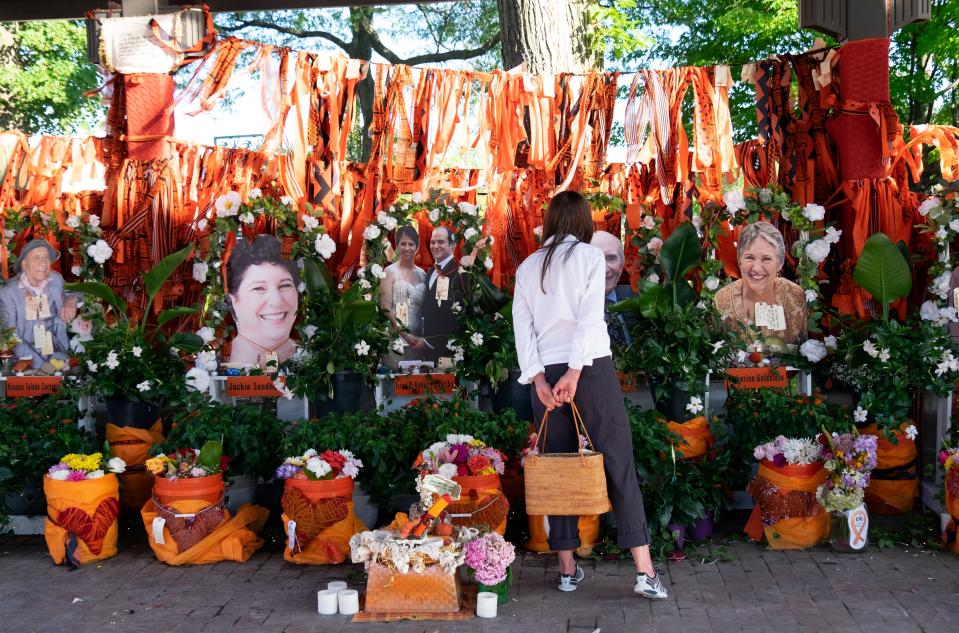
Like Cohen, resident Rachel Jacoby, 26, said she and her family are "trying to hang in there." Now that the news crews are gone and businesses have reopened downtown, daily life appears closer to normal, she said.
"But it's hard to feel normal when something traumatic has happened," she said. "Our innocence as a community was broken, especially among children and young people. It was all just shattered."
Gun control advocacy intensifies after attack
Long before the attack on their hometown, many Highland Park residents were already advocating for gun reform. High school students held marches and rallies weeks before the shooting. One local artist and activist, Jacqueline von Edelberg, even had an art installation up downtown highlighting child gun deaths.
The artwork, called "Enough," features 30,000 pieces of orange fabric representing the children killed in gun violence since the mass shooting at Sandy Hook Elementary School in Newtown, Connecticut, in 2012. The installation was originally located on Chicago's South Side, and pieces have been displayed across the country.
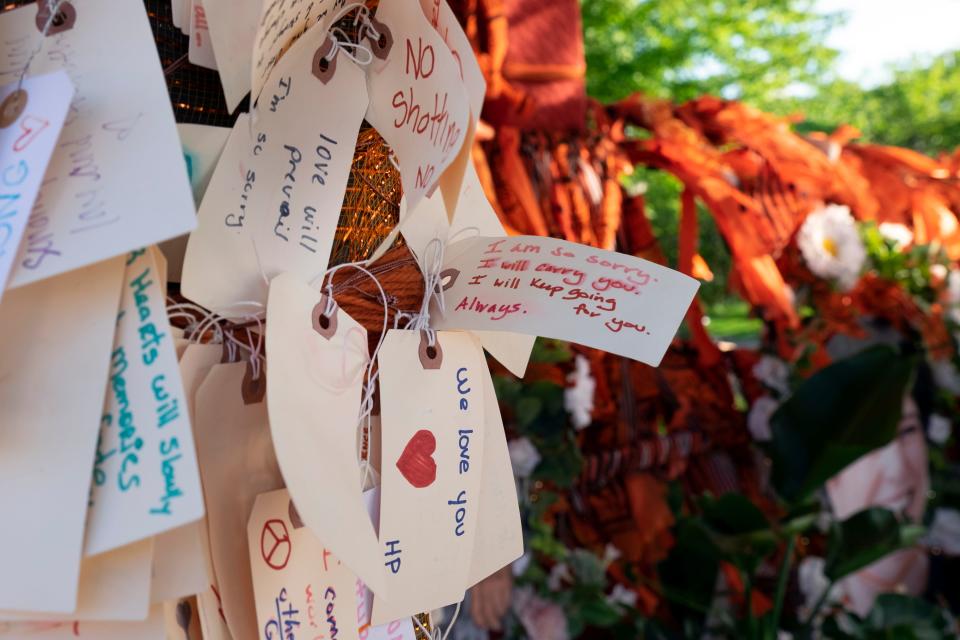
Nine days before the Highland Park shooting, residents gathered at the installation to read the names of the victims of the shooting at an elementary school in Uvalde, Texas. "We ended our speeches saying this could just as easily be our own kids," von Edelberg said.
She described her installation as the "literal thread" that connects gun violence in Highland Park to shootings in Chicago and across the country. "The pain itself is exactly the same," she said. "And the culprit for that pain is the same. It's our collective responsibility to solve this problem with every tool in our arsenal."
In the wake of the Highland Park shooting, von Edelberg began bringing pieces of orange fabric and yarn to a makeshift memorial site one block away. Since then, the site has been transformed – adorned with flowers, posters, candles, thousands of handwritten notes and orange yarn, representing gun violence prevention.

Von Edelberg said she has been at the memorial every day for the past month. The first week, many emergency responders came to pay their respects, she said. Next came the families who lost loved ones. Then came the survivors and the injured. Others visit late at night, when it's quiet, she said.
When people visit, von Edelberg encourages them to wrap pillars, trees or other objects in orange yarn. It gives people who are grieving a simple, therapeutic task to do, she said.
"I don't think, as a community, we're gonna recover from this quickly," von Edelberg said. "And I think having a place that feels healing and hopeful and positive is just an asset."
'A sense of urgency': Supreme Court's landmark guns ruling prompts race to test Second Amendment's limits
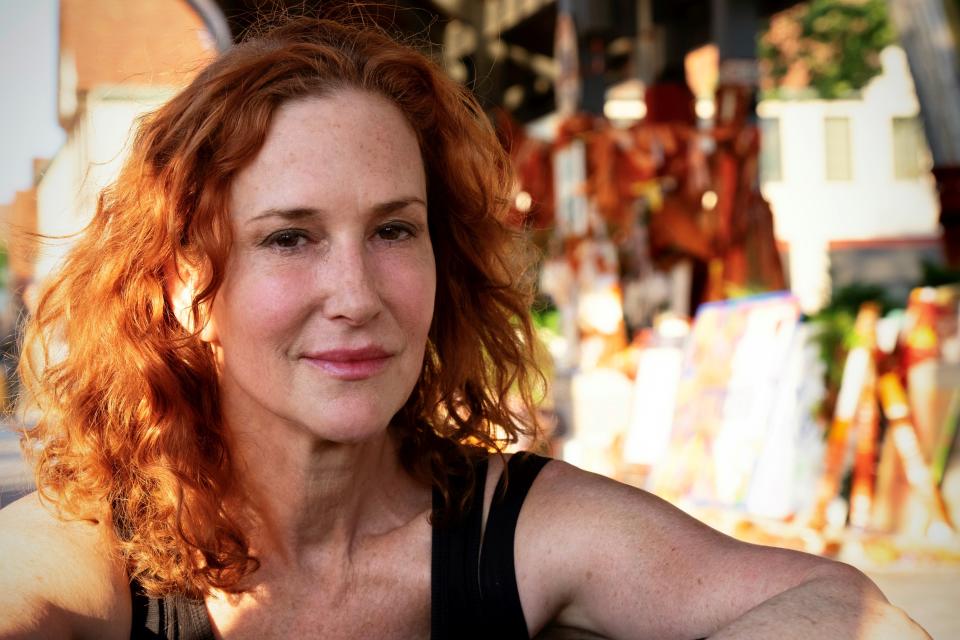
On Tuesday night, children drew chalk hearts on the sidewalk and teens refilled vases with water as others paid their respects in front of photos of the victims.
Resident Marcy Chbamu, 40, spoke with USA TODAY as she and her niece sat on a blanket and wrapped a stool in yarn. Her former co-worker Irina McCarthy was killed in the shooting.
"In one way or another, someone has to speak up," she said. "Sometimes, it's just doing these small things. We don't want these seven people who passed away to die in vain."
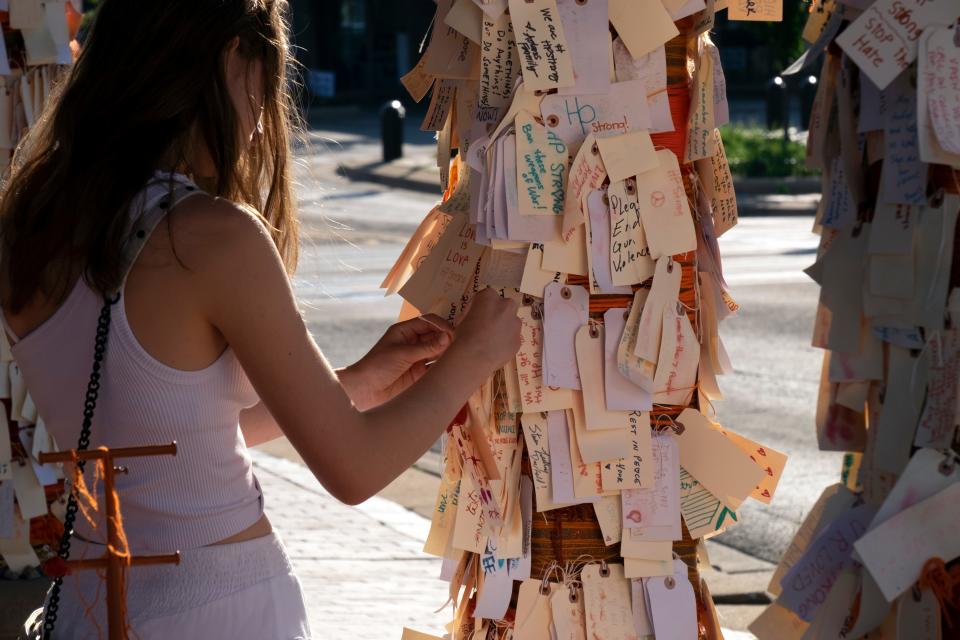
Activists push for federal assault weapons ban
Residents traveling to the nation's capital have brought pieces of the art installation and memorials with them to meetings and hearings with lawmakers.
Sen. Dick Durbin, D-Ill., placed pieces of the fabric on his desk during last month's Senate Judiciary Committee hearing on assault weapons. Jacoby, who sat in the chamber, held up a piece with Irina McCarthy's name on it.

"Less than a minute is all it took for a person with an assault weapon to shoot 83 rounds into a crowd, forever changing so many lives," Rotering, Highland Park's mayor, testified at the hearing.
Highland Park banned assault weapons and large-capacity magazines in 2013, after Sandy Hook. The U.S. Supreme Court refused to take up a challenge to the ban in 2015, and a federal appeals court later upheld it.
"This can't be done by single cities alone. It can't be done by single states alone. We need to have a strong federal response," Rotering told USA TODAY.
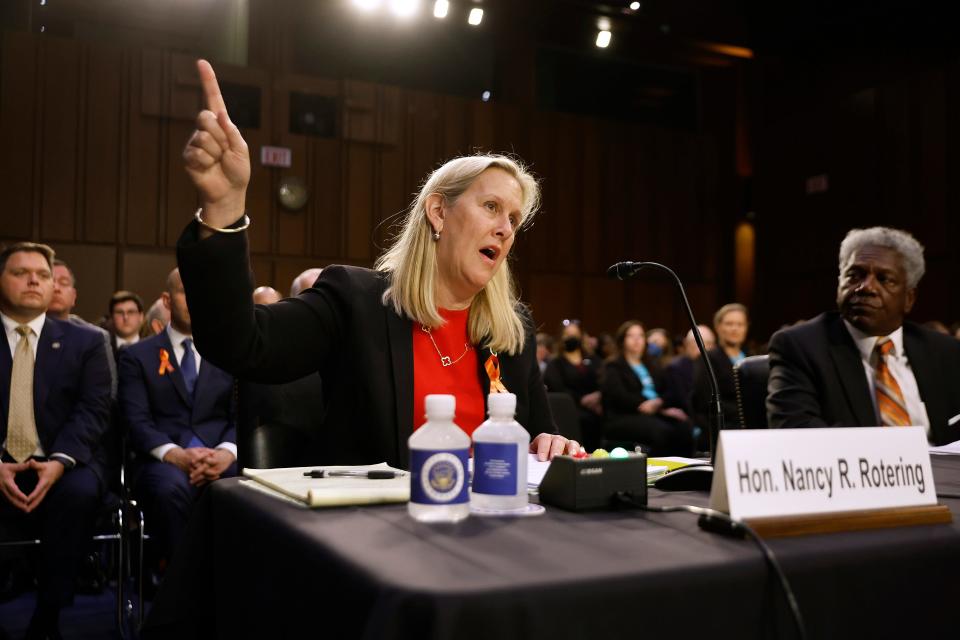
Resident Ashbey Beasley, 46, has been showing up at lawmakers’ Capitol Hill offices in recent weeks to tell her story and hand out printed victim impact statements. She fled the shooting that day with her 6-year-old son, who has been struggling to cope with the trauma of what he witnessed.
"The activism has sort of become my therapy," Beasley said. "There's no absolute answer that's going to prevent every single gun death. But we have to do everything in our power to do the things that we know will work."
As a result of the activism efforts, the House on Friday narrowly passed a bill that would make it illegal for anyone to import, sell, manufacture, transfer or possess certain semi-automatic weapons. Weapons sold before the bill's passage would not be affected.
A similar federal assault weapons ban was enacted as part of a sweeping anti-crime bill in 1994 and expired in 2004. But Republican lawmakers critical of the bill say it would infringe on gun rights. They also question how effective it would be at preventing gun violence.
Kyleanne Hunter, a senior political scientist at the RAND Corporation, told the Senate committee that the weapons are used in the minority of firearm homicides but are "disproportionately" used in mass shootings.
"When an assault weapon is used in one of these shootings, there are more than 14 times more injuries and twice as many deaths than when any other type of weapon is used," Hunter said. "And it's because these weapons were designed to kill as many people as quickly as possible."
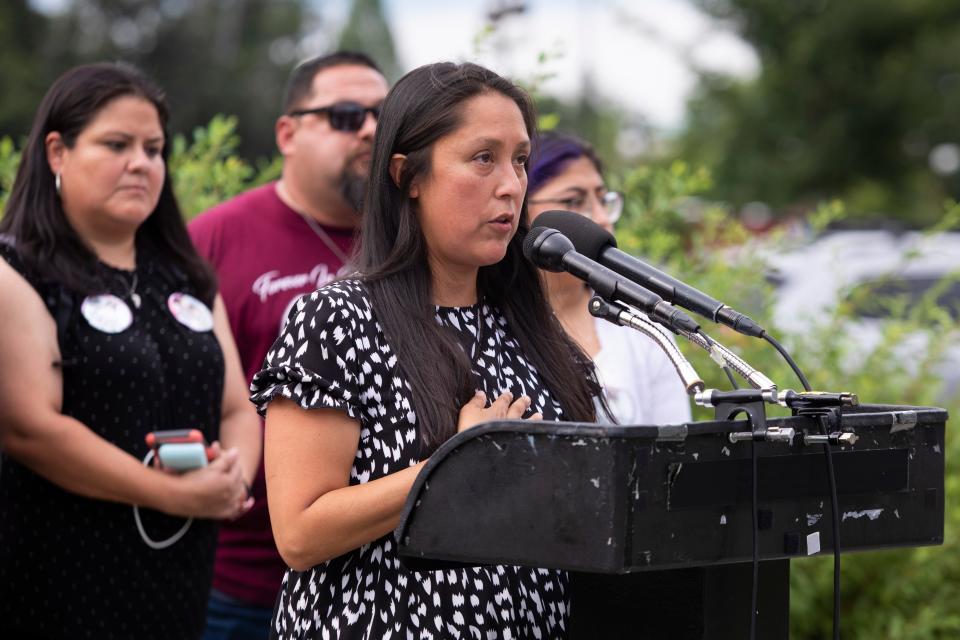
AR-15-style rifles were used in the mass shootings in Uvalde, Texas; Buffalo, New York; Parkland, Florida; Las Vegas; and Newtown, Connecticut.
Kitty Brandtner, founder of March Fourth, an organization developed after the Highland Park shooting, said activists were initially told a federal ban on assault weapons would not "see the light of day."
Now, Brandtner, 35, said she's been told it will be "impossible" to get the bill through the Senate. The ban would require at least 10 Republicans to join all 50 Democrats to overcome a filibuster.
Fifty-one percent of Americans favor a nationwide ban on the sale of AR-15 rifles and similar semiautomatic assault weapons, according to an Associated Press-NORC poll conducted in May.
Jacoby said she is continuing to host in-person rallies and virtual phone banks. She hopes to overcome the odds and get the ban passed – or at least force politicians to record their vote.
"We are here to show that if you put your minds and voices together, especially when there is a majority of Americans that want this, anything is possible," Brandtner said.
Contact reporter Grace Hauck via email at ghauck@usatoday.com or on Twitter at @grace_hauck.
This article originally appeared on USA TODAY: Highland Park July 4 parade shooting has prompted new wave of activism

